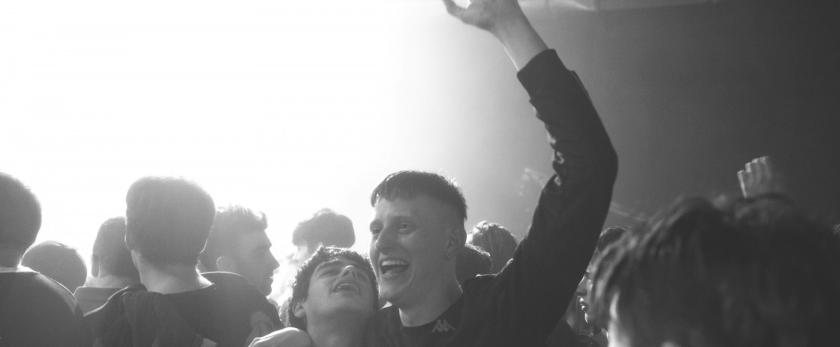Achingly nostalgic for rave culture, Beats will likely appeal to anyone whose formative experience of ardent friendships and communal joy peaked in a transcendent musical setting with or without the help of Ecstasy.
Director Brian Welsh’s Scottish film, larky though it is in places, packs a greater social punch than such previous rave movies as Human Traffic (1999), Groove (2000), and Eden (2014). It was expanded by Welsh and Kieron Hurley from the latter’s 2012 play. Johnno (Cristian Ortega) and his best mate Spanner (Lorn MacDonald), techno-obsessed 15-year-olds living in a dying industrial West Lothian town, suffer familiar domestic problems. Johnno’s mother Alison (Laura Fraser) and her partner Robert (Brian Ferguson), a uniformed police officer, are about to move him and his little stepbrother to suburbia. Parentless Spanner gets kicked around by his older thug of a brother.
Johnno and Spanner are desperate to get to an upcoming rave, their first, which has been advertised as a revolt by the anarchistic underground DJ D-Man (Ross Mann). It’s 1994 and raves are an endangered species: the paranoid Tory government’s Criminal Justice and Public Order Act has risibly outlawed “public gatherings around amplified music characterized by the emission of a succession of repetitive beats”.
Actors MacDonald and Ortega make a terrific double act
The boys are brought to D-Man by a fierce troika of female friends: Cat (Amy Manson), Wendy (Rachel Jackson), and Laura (Gemma McElhinney), the quietest of the three.The film’s timid protagonist, Johnno starts to emerge from his shell by helping to defend Laura from her abusive drug-dealer boyfriend and playing his part, albeit nervously, in getting the six of them to the rave.
It proves a dream come true that ends in a nightmare – riot police laying into the ravers as if they were mineworkers’ pickets at Orgreave 10 years previously. Beats makes its socio-political points well: a punctuating tracking shot past a row of TVs intersperses scenes of industrial protests with images of Tony Blair, whose vision of “New Labour” for a “New Britain” would weaken its traditional role as the party of the working class.
This betrayal resonates with Johnno’s imminent departure for a middle-class life. Beats eventually sets aside the promising romance between Johnno and Laura to re-focus on the feelings between the two boys. A single shot indicates that for the bluff, jokey Spanner, who has faint understanding of his needs, a crisis is looming beyond the everyday threat of his brother’s violence and his no-future future. Actors MacDonald and Ortega make a terrific double act: the rowdy extrovert yearning for affection and the lugubrious, self-knowing introvert.
Welsh (Glasgow Girls) staged a real rave for Beats' synesthetic set piece and had musical supervisor Keith McIvor (aka JD Twitch) deejay it. To the sound of Vapourspace’s empyrean “Gravitational Arch of 10”, the color visuals supplied by Weirdcore (Nicky Smith) splash over Ben Kračun’s roving crystalline black and white cinematography. (The imagery here – including toppling chimneys – underscores the mood of industrial blight.) The sequence puts you in Johnno, Spanner, and their friends’ heads, and that’s no small feat.















Add comment